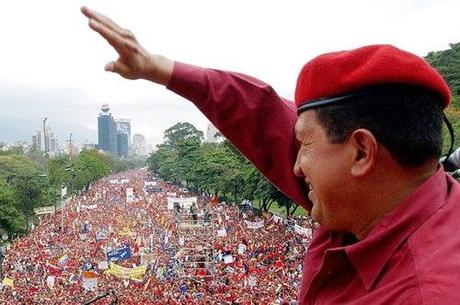 I join the people of Venezuela today in mourning the death of their President, Hugo Chavez (lovingly known as "El Comandante"). On Tuesday evening, Vice-President Nicola Madura announced to the nation in a televised broadcast that President Chavez had died at 4:35pm. He had been fighting a battle with cancer for several years, and although re-elected to a new term as president, had been unable to publicly take his oath of office due to his illness. President Chavez had held office since 1999.
I join the people of Venezuela today in mourning the death of their President, Hugo Chavez (lovingly known as "El Comandante"). On Tuesday evening, Vice-President Nicola Madura announced to the nation in a televised broadcast that President Chavez had died at 4:35pm. He had been fighting a battle with cancer for several years, and although re-elected to a new term as president, had been unable to publicly take his oath of office due to his illness. President Chavez had held office since 1999.He was elected, and re-elected by large margins. The U.S. government has repeatedly referred to President Chavez as a dictator or an autocrat. That is (and always was) a vicious lie. The truth is that he was a popularly elected president in elections that were monitored by international organizations, and found to be free and fair. And his electoral margins were larger than for any recent American president (the closest election being the most recent, where he won 54% of the vote to 39% for his opponent).
The truth is that the U.S. government was just mad because President Chavez nationalized the oil of Venezuela (one of the largest oil reserves in the world). They were just bowing to the wishes of the big oil companies, and in fact, even funded and coordinated a coup attempt in 2002 to unseat President Chavez and return ownership of that country's oil to the giant oil companies. Fortunately the coup failed.
President Chavez was right to nationalize Venezuelan oil reserves, and use that oil money to help the people of Venezuela (instead of fattening the bank accounts of Big Oil). During the first decade of the Chavez presidency poverty in Venezuela was cut in half, the child mortality rate was cut by a third, malnutrition deaths were cut in half, and college enrollment was doubled. While President Chavez was not able to solve all of Venezuela's problems, he did more to help the poor, the underprivileged, and the indigenous people of that country than any previous Venezuelan leader.
And that was not all he did. He also showed a willingness to help other Latin American countries -- by providing them with oil at very cheap prices. This enabled them to be more prosperous, and to at least partially, get out from under the thumb of American corporations. He will be sorely missed, both in Venezuela and throughout Latin America.
One of the best tributes to President Hugo Chavez was written by Rep. Jose E. Serrano (D-New York). Here is what he had to say:
“I met President Chavez in 2005 when he came to my district at my invitation. His focus on the issues faced by the poor and disenfranchised in his country made him a truly revolutionary leader in the history of Latin America. He understood that after 400 years on the outside of the established power structure looking in, it was time that the poor had a chance at seeing their problems and issues addressed. His core belief was in the dignity and common humanity of all people in Venezuela and in the world. “When he visited, President Chavez offered a new type of program to the people of the Bronx. He had harnessed the power of his nation’s oil resources and was using their profits—through Citgo—to enact social spending programs. Now he offered people in the Bronx that were struggling economically the same deal. He would provide home heating oil at a huge discount, provided the savings were reinvested in programs that benefited the underserved and underprivileged. I am proud to report that we have benefited from that program ever since, with millions invested in our community through this program and through a grant program he set up. “Though President Chavez was accused of many things, it is important to remember that he was democratically-elected many times in elections that were declared free and fair by international monitors. Even today, people in North America seem unable to accept that Venezuelans had taken our admonitions to have democracy to heart and elected the leader of their choice. President Chavez carried out the programs that his constituents wanted enacted, and won reelection. This too was revolutionary in the history of Latin America, where coup d’etat have been historically a way of power changing hands—especially during the times of controversial leaders. “President Chavez was a controversial leader. But at his core he was a man who came from very little and used his unique talents and gifts to try to lift up the people and the communities that reflected his impoverished roots. He believed that the government of the country should be used to empower the masses, not the few. He understood democracy and basic human desires for a dignified life. His legacy in his nation, and in the hemisphere, will be assured as the people he inspired continue to strive for a better life for the poor and downtrodden.”

